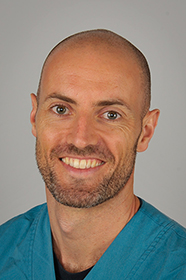 MBChB, FACEM, Dip Child Health, PG Cert Med Ed
MBChB, FACEM, Dip Child Health, PG Cert Med EdCurrent roles
- Clinical Practice Fellow, Emergency Medicine
- Emergency Medicine Specialist
Research expertise
- Early career researcher. Publications in toxicology, critical care and simulation-based education.
Background
My role at Otago is primarily as an educator. I am the co-convenor for the Emergency & Acute Care module which is a 6 week rotation in ALM 6 (Trainee Intern Year). We provide our students a practical foundation for the assessment and management of acutely unwell and undifferentiated patients. We use workshops and practical skills sessions to supplement simulated scenarios that help final year medical students to increase their skills in the immediate management of acutely deteriorating patients.
I am also a supervisor for clinical research that is being undertaken by advanced trainees in emergency medicine. The topics of this research include the use of biomarkers in traumatic brain injury; investigation of team dynamics and leadership in teams managing medical emergencies.
Contact details
Department of Surgery & Anaesthesia
Te Tari Hāparapara, Te Tari Whāomoomo
University of Otago, Wellington
PO Box 7343
Wellington South
Email david.mcquade@otago.ac.nz
Publications
Rogan, A., Sik, A., Dickinson, E., Patel, V., Peckler, B., McQuade, D., Larsen, P. D., endorsed by ACEM Emergency Department Epidemiology Network. (2023). Diagnostic performance of S100B as a rule-out test for intracranial pathology in head-injured patients presenting to the emergency department who meet NICE Head Injury Guideline criteria for CT-head scan. Emergency Medicine Journal, 40, 159-166. doi: 10.1136/emermed-2022-212549 Journal - Research Article
Rogan, A., Brunton-O'Sullivan, M., Holley, A., McQuade, D. d., & Larsen, P. (2022). Can serum biomarkers be used to rule out significant intracranial pathology in emergency department patients with mild traumatic brain injury? A systemic review & meta-analysis. Injury, 53, 259-271. doi: 10.1016/j.injury.2021.10.015 Journal - Research Article
Rogan, A., Patel, V., Birdling, J., Lockett, J., Simmonds, H., McQuade, D., & Larsen, P. (2022). Acute traumatic brain injury and the use of head computed tomography scans in the emergency department. Trauma, 24(4), 327-336. doi: 10.1177/14604086211023646 Journal - Research Article
Rogan, A., Patel, V., Birdling, J., Lockett, J., Simmonds, H., McQuade, D., Quigley, P., & Larsen, P. (2021). Alcohol and acute traumatic brain injury in the emergency department. Emergency Medicine Australasia, 33, 718-727. doi: 10.1111/1742-6723.13726 Journal - Research Article
Armstrong, P., Peckler, B., Pilkinton-Ching, J., McQuade, D., & Rogan, A. (2021). Effect of simulation training on nurse leadership in a shared leadership model for cardiopulmonary resuscitation in the emergency department. Emergency Medicine Australasia, 33, 255-261. doi: 10.1111/1742-6723.13605 Journal - Research Article